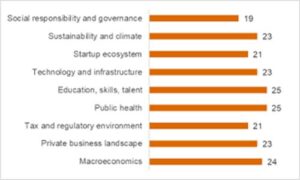Within the Europe, Middle East and Africa (EMEA) region, South Africa is being looked at in a more favourable light as a location for private business.
According to PwC’s latest EMEA Private Business Attractiveness Index, South Africa ranks 23rd out of 33 countries. This is an improvement from 2021 and 2022 when the country ranked 31st and 25th, respectively.
Duncan Adriaans, PwC Africa private leader, says: “The two-year improvement reflects positively on South Africa’s Economic Reconstruction and Recovery Plan (ERRP) which, as part of structural reforms aimed at helping the economy recover from Covid-19, pledged in 2020 to make it easier for private businesses to operate in the country.
“We can see this in, for example, the regulatory reforms and incentives implemented that allow businesses to invest in renewable energy installations. As a result, rooftop solar capacity in the country increased from less than 1 000 MW in 2021 to 5 200 MW at present, as reforms and incentives allowed businesses and households to invest in their energy security.”
The index, which PwC compiles on an annual basis, assesses and ranks 33 countries across EMEA as whether they are conducive locations for private businesses, based on an objective analysis of a range of attributes. To determine the overall rankings, we look at 64 metrics across nine categories, as listed in the graph below.

Source: PwC EMEA Private Business Attractiveness Index 2023.
PwC’s latest benchmarking of this data clearly demonstrates that when countries have the key attributes in place to support entrepreneurial and private businesses activity, they remain attractive irrespective of short-term economic or social challenges.
This is reflected in South Africa’s ranking for the number of investors (for example, venture capital and private equity firms) located in the country improving from 24th in 2001 to 20th in 2023, despite a long list of operational challenges for businesses.
Adriaans says: “While every private business is unique, they all share some common needs that are consistent wherever they are based. PwC’s latest research shows that South Africa, despite its many operational challenges, is becoming a more attractive location for private business compared to countries in the EMEA region.
“In fact, South Africa ranks as a more attractive operating environment for private business compared to several members of the European Union (EU).”
Entrepreneurial and private companies are generally less able than large corporations to move easily between different jurisdictions. This strengthens their tendency to look at a location’s fundamental attributes and long-term future potential when making investment choices based on geographic location.
This is where benchmarking research plays an important role. The latest report provides an ‘outside-in’ view to outline economic, social, environmental, technological and regulatory environments across key private business jurisdictions in EMEA, and will enable private business leaders (C-suite and their boards) to understand the region better and operate more successfully in these countries.
South Africa’s best sub-index performance in the 2023 report is for social responsibility and governance – it ranked 19th out of 33 countries. This places South Africa in the middle third (ranked between 12th and 22nd) of countries in the report, and reflects positively on factors like the proportion of seats held by women in parliament (ranked 1st out of 33 countries), trust in government (ranked 12th), and press freedom (ranked 17th).
While South Africa certainly has challenges in several governance-related areas, the social responsibility and governance pillar does reflect a level of trust within society that many would often assume is much better in comparative countries.
“In fact, South Africa’s performance in this pillar provides a beacon of hope for the country in an uncertain 2024,” Adriaans says.
However, despite South Africa’s improving rankings in the Index, the country’s 23rd overall position out of 33 shows that it still faces many challenges that make it difficult to operate a business in the country.
These include electricity load-shedding, skills shortages and high levels of unemployment, a scourge of crime and corruption, deteriorating transport and logistics services, and challenges to access capital and finance for entrepreneurs and private business, among many others.
Access to capital and finance is a key component of “The Owner’s Agenda”: PwC’s framework designed to assist private businesses in developing business strategies in a consistent and integrated way.
As part of overall business strategy, effective management of capital and finances is key for sustaining a business. This is especially the case during times of disruption, uncertainty and crises — and, as noted in PwC’s South Africa Economic Outlook January 2024 report, the world will continue to experience more frequent, more severe and more impactful short-term crises going forward.
Understanding and strengthening the balance sheet is another essential endeavour for businesses to navigate these turbulent times and ensure long-term sustainability. For private businesses, building balance sheet resilience can come in many forms, including, proactive refinancing, establishing financial buffers, re-examine treasury management practices to protect liquidity, and conducting stress testing exercises, among others:
- Proactive refinance by reviewing borrowings and refinancing options that align with business goals.
- Establish financial buffers by creating a cushion to withstand potential shocks over time.
- Re-examine treasury management practices to protect liquidity.
- Conduct stress testing exercises to assess the impact of various scenarios on the balance sheet.
Effective communication with stakeholders also plays a vital role in building balance sheet resilience, as regular interactions can foster trust and understanding among management, employees and labour representatives, the board, etc. It also creates a strong support network during times of economic and financial uncertainty.
Andrew King, PwC South Africa associate director in capital advisory and restructuring services, says: “Prioritising balance sheet resilience is crucial for businesses to navigate uncertain times successfully. By proactively managing the capital structure, allocating resources effectively, thoroughly assessing balance sheet health, and establishing open lines of communication with stakeholders, businesses can strengthen their resilience and ensure sustainable growth in the face of adversity.”

